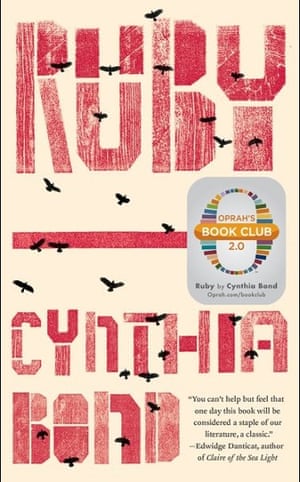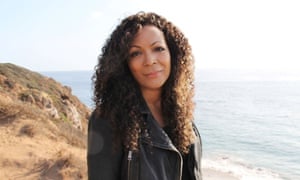“Hell, ain’t nothing strange when Colored go crazy. Strange is when we don’t,” remarks a character in Cynthia Bond’s new novel, Ruby. And yet the people of Liberty Township in east Texas attribute the “howling, half-naked” madness of the title character to her own sins and travels, both a comeuppance for her preternatural beauty and an active choice. The locals never for a second stop to consider that Ruby Bell, the haunted, fatherless child of a light-skinned, red-haired woman, might have been shaped by the grinding weight of history.
As Bond constructs that history over the 330 pages, we feel just how heavy it is. Before Ruby is even born, her aunt is shot and killed by the sheriff’s deputies for relenting to a married white man’s demands. As soon as Ruby is born, Ruby’s mother leaves her caramel-skinned baby girl and flees the rapes and ropes of the south to reinvent herself as a white woman in New York City. As a young child, with no adult protectors and only her friend Maggie to watch over her, Ruby is sent away and made to do horrifying things for pocket change. She keeps her lips numb and her eyes empty.
 Ruby by Cynthia Bond.
Ruby by Cynthia Bond.In 1950, Ruby makes her escape to New York, “where Colored girls and White pretended to be equal”, to look for her mother. And while she wears Chanel perfume, loses a bit of her east Texas accent, and receives a conspiratorial wink from James Baldwin, the big city is almost as cruel to her as the small town had been. A telegram calls her home in 1963, right as hundreds are flocking north to the March on Washington. “Like a lone salmon Ruby had taken the road south,” which is where we find her when the novel begins, living on her family’s land and talking to invisible spirits. She has completely unraveled.
Many will compare Ruby to the work of Toni Morrison or Zora Neale Hurston, as Oprah Winfrey has. (She’s chosen it as the fourth selection in her Book Club 2.0.) Ruby’s scenes of satanism and sexual abuse also evoke HBO’s True Detective, which is set in nearby Louisiana and has quite a few details in common with a true story. A few plot points might be similar, but Bond recounts the events from the perspective of a survivor who relives them every day, not an outside investigator cushioned by time and distance. The effect is profoundly different.
It may be most apt to compare Bond to Gabriel García Márquez. Ruby is woven with magical realism. The roots of the pines and branches of the chinaberry tree and circling crows and gleaming white lay angel cake are far more than scenery and props: they are plot. In Ruby, the supernatural and the natural are knotted together, so that it’s hardly necessary to explain how each demon is created by ghastly human actions. It takes a people intimately familiar with the evil of which men are capable to believe in a true and present Satan. And so even the most pious churchgoers in Liberty Township salt the corners of their home to ward off haints, or ghostly lost souls. More than once, Ruby herself is called a haint. She is a still-living reminder that the horrors of the past are not dead.
A plot this heavy usually risks tipping into melodrama, but Bond’s luminous prose is grounded in a sure reality. Bond, like her novel’s eponymous heroine, was born in east Texas. Her aunt, too, was murdered by a Klan-affiliated sheriff and his deputies. Bond, too, was a victim of sex trafficking. Like Ruby, she sought out a life in the city – in her case, New York, Chicago and now Los Angeles, where she works with at-risk youth. At age 53, this is Bond’s first novel, and it took her more than a decade to complete. “Writing Ruby,” she says in a Q&A appended to the book, “became my salvation.”
Ruby finds her salvation – or perhaps, more accurately, the path to it – in Ephram Jennings, the son of an evil-spirited preacher and his northern-born wife who “ripped out the seams of her own dreams and patched them into his”. Both of Ephram’s parents meet tragic ends: his mother has a breakdown and is shipped off to a mental hospital after discovering the truth about her husband, who is himself lynched by white men a few years later. Young Ephram bears witness to both events, and is raised by his sister Celia, a hard-edged woman of God with whom he lives for the next three decades, calling her “mama”. The celibate routine of weekdays spent bagging groceries at the Piggly Wiggly and Sundays spent in church cannot erase the childhood memory of a supernatural sliver of an afternoon with Ruby. When he sees her in the local market, 13 years after her departure for New York, he recognizes her instantly. And he continues to see her even as she lets the crazy envelop her completely and the rest of the town goes blind to her.
In this way, Ruby is a love story about pure-hearted patience conquering insurmountable odds. A lifetime of abuse has taught Ruby that “men were a slight discord that she waited to pass”, and so Ephram must prove his devotion to her. He must then defend it in front of the entire town – which might be slow to see, but is quick to judge. When he stands up for Ruby, whose decade of erratic behaviour has compounded her childhood reputation as a vessel for all of the evil swirling through the community, a churchgoer scolds Ephram: “You sound like you been batter-dipped and fried in wrongfulness.” Even he questions his commitment to a woman who has survived the unsurvivable as he is pulled deeper into her world: “Maybe crazy was a cold you caught.”
Bond reveals slowly, over the course of the novel, that the women deemed crazy in Liberty Township are the women who acknowledge the dual blunt forces of racism and sexism in their lives, and come to realize just how difficult it is to rise above them. In that sense, perhaps crazy is contagious. Once they recognize such injustice and decide to face it, they challenge those around them to see it, too.

 Cynthia Bond: never tips over into melodrama. Photograph: Supplied
Cynthia Bond: never tips over into melodrama. Photograph: Supplied